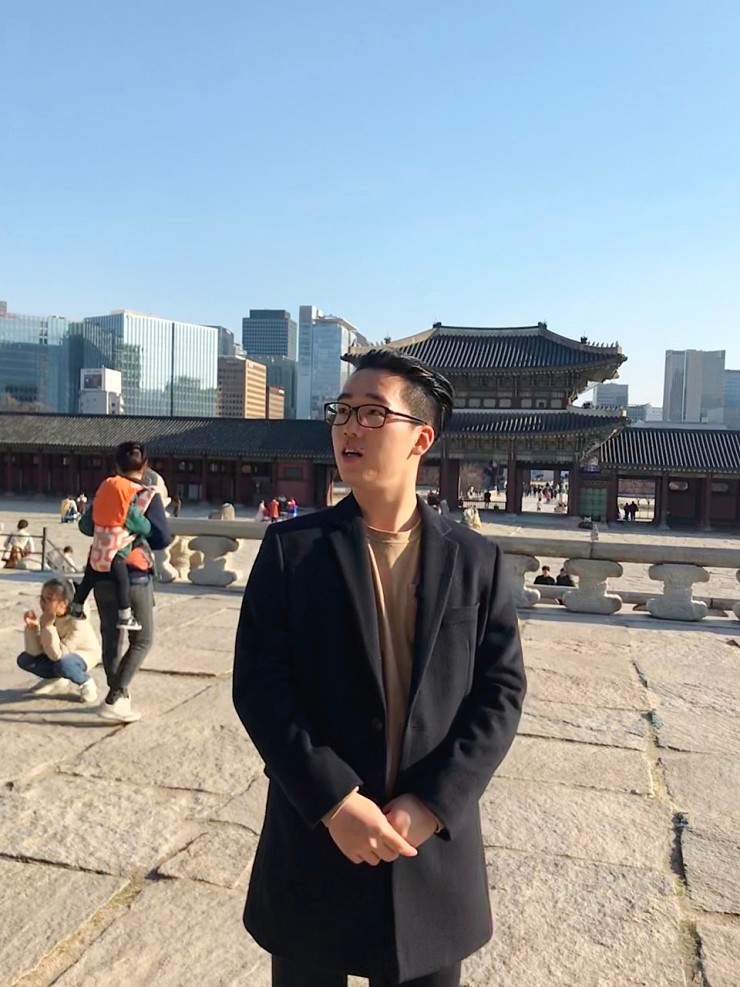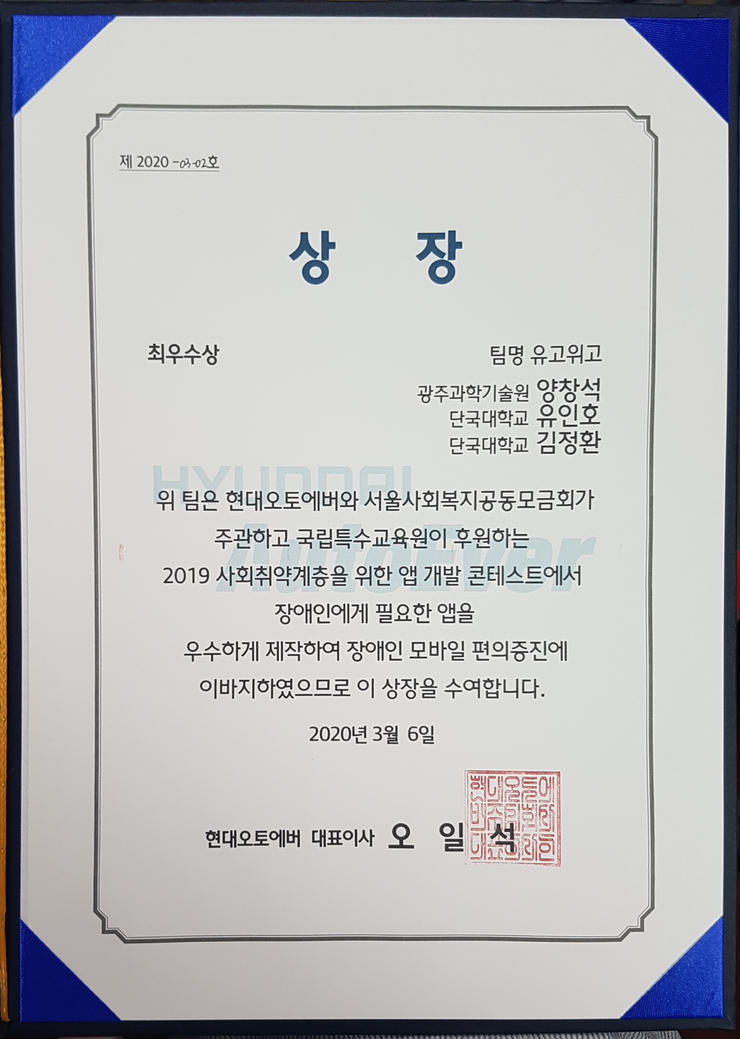A team of Dankook University (DKU) students, led by senior Kim Jeong-hwan, won the grand prize in Barrier Free App Development Contest. The group, known as You go We go, also included a graduate student from the Gwangju Institute of Science and Technology (GIST).
The Barrier Free App Development Contest is a social contribution project, sponsored by Hyundai Autoever, the Seoul Community Chest of Korea and the National Special Education Center. This contest is aimed at supporting people with physical disabilities. According to contest officials, forty-three teams participated in the Barrier-Free App Development Contest, with fifteen teams passing the document review process and only ten teams making the final selection. Hyundai Autoever supports mentoring program for participants to help them improve the quality of developing an app. After the contest, the company held an app production presentation in February 2020.
To learn more about their experience, The Dankook Herald (DKH) interviewed Kim Jeong-hwan.
 |
| ▲ The picture of the student Kim Jeong-hwan (Photo from student Kim Jeong-hwan) |
Q1. What motivated you to participate in the ‘The barrier Free App Development contest?’
A: My friend suggested we participate in the contest together. At that time, I thought that it would be a great chance to study computer vision and machine learning. So, I accepted his offer without hesitation.
Q2: What was the hardest thing you experienced when developing the app, and how did you solve it?
A: When we had program errors, I had no idea what to do. It always stressed me out because I had to study and do my part-time job at that time. Regardless of these challenging situations, I had to develop a perfect app and as time went on, I was able to overcome the problems by concentrating on my job without any complaints. Therefore, I realized the importance of tenacity and never giving up.
Q3: What is the most important thing to know when you develop an application?
A: It depends on the scale of the project. In my case, it was teamwork. The development process wasn’t that hard. However, it was difficult to lead a project together. There was a little problem since each of us had different ideas. In this case, the most important thing in developing an app was conversation, comprehension, encouragement, and advice, which is what I call ‘teamwork’.
Q4: How did you come up with ideas during the contest?
A: I usually got Ideas from the users. The application we made is designed to prevent visually impaired people from bumping into or tripping on bollards while walking on the street. At the beginning, we listed all the ideas and functions we came up with and sought advice from visually impaired people. Based on their feedback, we revised the app until we got a satisfying result. This method is called ‘Design Thinking’, which is often used by famous corporations. I was able to learn this from Professor Yoon Ji-hyun, from Creative convergence education.
Q5: Many students think that there are high entry barriers in developing applications. Can you give an advice to students who want to develop an application?
A: Before I participated in the contest, I barely knew how to use the programming language JAVA. So, I needed to learn about JAVA and android studio. I have some advice for students who are new to app development. First, I recommend they buy a book and practice their basic skills, and then use open sources to modify them and apply them to their applications
Q6: Do you have any development plans related to Barrier free in the future?
A: We are constantly upgrading the app version. We are applying some upgraded functions and ideas which were unable to be include at the early stage because of a lack of technical skills. For example, we are going to upgrade this app to recognize round bollards better. We collected about two million photos of bollards, but the data regarding circular bollards was less than our right-angle bollard data, so it couldn’t recognize them as well. Thus, we will continue to collect more video data and upgrade the performance of our app.
Q7: What do you think about ‘Barrier Free’?
A: It’s a link between technology and life. Before I enrolled in the competition, I thought that complex and difficult technology is the best technology, but I changed my mind after the contest. Now I believe that technology that enriches life is the best technology. This is because I learned that sometimes easier technologies can make life more convenient. During our interviews with visually impaired people, I realized that the functions they wanted did not require difficult technologies. They said it’s very helpful just to give voice signals of the bollard’s location through GPS. Thanks to Barrier Free, practical technologies can break down walls in society for our most vulnerable populations.
Q8. Is there anything you would like to say to Dankook University Students?
A. I contemplated a lot while traveling. I reflected on my past and present and painted the future. So, I was able to realize what I like, what I’m good at, and what kind of person I am. I am satisfied with my current college life. I like to study my favorite field, meet new people, and grow through trial and error. I think all of this is an undergraduate student’s privilege. So, I hope you have a meaningful life at college.
Since this app was developed based on the opinion of the blind people, it is considerably useful. It was made with practical techniques and offers a service they really wanted. This app is continuously being updated and as a result, in the future, many blind people will be able to walk street without bumping into things the seeing world takes for granted.
 |
| ▲ Team ‘You go We go’ earned the grand prize in Barrier Free App Development Contest. (Photo from student Kim Jeong-hwan) |
박유정, 이지희 dankookherald@gmail.com

![[Campus Magnifier] Let's Surf the Library!](/news/photo/202404/12496_1765_4143.jpg) [Campus Magnifier] Let's Surf the Library!
[Campus Magnifier] Let's Surf the Library!
![[Campus Magnifier] Let's Surf the Library!](/news/thumbnail/202404/12496_1765_4143_v150.jpg)





